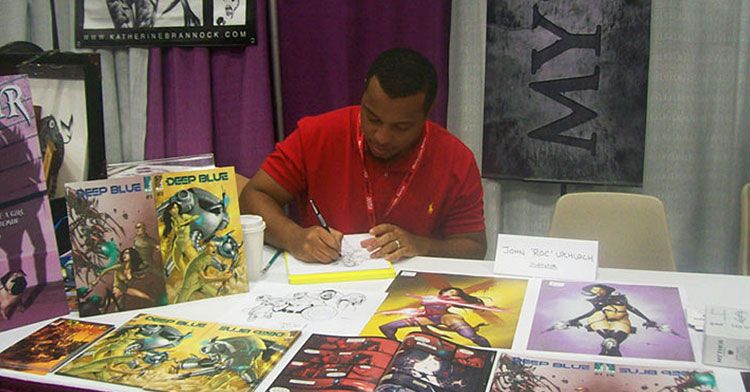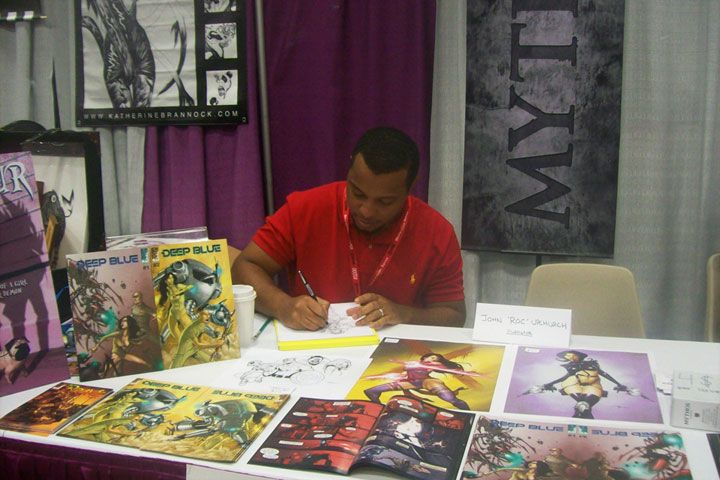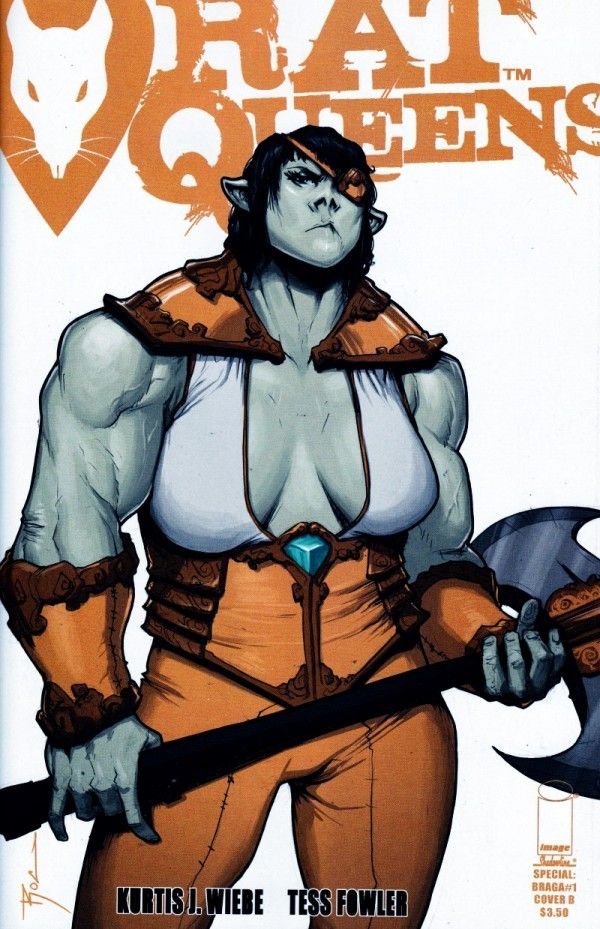Last October, artist Roc Upchurch was arrested under the charge of "Battery-Family Violence, First Offense Misdemeanor" following a fight with his ex-wife on Halloween. In the wake of this personal incident, Upchurch spoke with Bleeding Cool, confirming the arrest and sharing that his relationship had faced turmoil for quite some time. In the weeks that followed, Upchurch left "Rat Queens" and pulled away from comics in general. While speculations were made about the incident, no one but those involved will ever know the true story.
Recently, Upchurch reached out to CBR News, expressing interest in speaking publicly about where his life, career and legal issues now stand. Over the course of an hour-long conversation, we discussed details from the domestic violence charge, his subsequent therapy and his plans to steer his life in a more positive direction.
CBR News: Roc, why is this the right time to catch up on where you are right now?
Roc Upchurch: It's finally getting things back on track -- things with my kids, things with my ex-wife. I'm getting back into a workflow. I'm picking up the pieces and putting things back together.
Why did you request to do this interview with me? There could be questions about why you chose to have this discussion with a woman, and I'd like to hear your thoughts.
I think it's important that I speak to a woman, just because of the circumstances. I feel like having a female voice, one that won't be biased or unfair one way or the other, is important. Talking to a male would be easier. I feel like when things like this happen, people -- especially men -- tend to side with other men. To me, that's an unfair way of looking at things, especially since people don't know the entire story. People don't know how things got to the point they got to. They side with their gender just because, without knowing facts or what happened. I don't want that. I don't want people against me because I'm a man, or for me because I'm a man. I don't want the gender-siding. It's unfair to the whole situation, and it doesn't portray what the actual problems are. It doesn't get to the heart of what's going on, or anything.
You were forthcoming regarding the domestic violence incident last year. Where are things at with you and your family now? Are you doing okay?
For me, doing okay is knowing that my children are okay. Of course, other things are important -- my career, things like that. But everything comes second to how my children were affected by everything. Now that my ex-wife and I have decided to work together to make things as good as possible for our children -- our family will never be a whole family again, but we can take what we have and make it the best for them. That idea alone makes me better, knowing that we are working for their betterment makes me better, despite whatever else happens. That's the main thing, for me.
Outside of that, I want to get forward momentum in my career and in my life. Life took an abrupt stop, everything felt like the end of the world, even before the incident last year. Everything felt like the end -- to come out of that in a positive way really helped to turn things around and move things in a positive direction.
What is the legal status of any charges filed against you?
The status of the domestic violence is that it's being wiped off my record. I've been in this counseling program for the past six months. I don't want to downplay this -- the court looked at it as a minor thing, but I see it as a major thing. It was horrible. It was the worst thing. In actuality, it was a symptom of a much bigger thing going on with me. It was never jail time, other than my initial holding. It was a minor offense to the courts. It'll be expunged. But that downplays the ramifications on everything else.
You said this was a symptom -- what was this a symptom of?
There were a lot of things going on at that time, divorce being the main thing, and also my family dealing with a loss. We lost my grandmother, who was a very important person to us, to my siblings, my children, my ex-wife. Everything was hard around that time, which was weird, because on the career side, things were good. But everything with my family was falling to pieces. We were all being affected. There were a lot of bigger life issues that stemmed from it [that] I personally should have been able to cut off before it escalated. I saw myself, and I was the head of the household, and I feel like I should've held things together better. I should've been a stronger glue through all of that. Things fell apart. As horrible as it was, it was a symptom.
How did it affect you professionally?
It did in a way that affected people's perceptions of me, of who I am. I think people who know me would see that and see it for what it is -- they'd take it at face value. People that may have known me began to question if they really knew me or not. It changed people's views of me. In my career, that affected everything. If people see you in any negative way, obviously, they don't want to support you.
What do you want people to know about what happened?
I want them to know that I don't downplay domestic violence. By saying mistakes happen, by saying people fall -- that's not downplaying the seriousness in any way. I'm against it on every level. I'm against everything about it. A lot of what I get is deserved, the backlash and everything. I didn't feel like anything directed at ["Rat Queens" co-creator/writer] Kurtis [Wiebe] was deserved, but at me? Of course. Of course it was deserved. Kurtis is a dear friend to me. He is literally one of the best people I know. When he started to get backlash from it, I immediately wanted to distance myself from my friend and from what we created, which was hard.
I hope people know that I realize it was serious and is serious. It has lasting effects. There are residual, lasting effects that will continue long from now. I'm learning from that, and I know it was the worst possible thing -- I'm doing everything not to even get close to that again. I'm doing everything I can to do the opposite of that. I want to focus on making the right decisions for my family, for my career, for everything.
Do you feel like you're ready to start re-engaging with the community again?
I think so. The reason I wasn't ready before was because I couldn't really focus on anything other than repair. I couldn't see anything other than fixing things with my kids, with work. I was only focusing on the negatives, on the bad and on everything I'd done wrong. I've stopped that, and now I want to make things positive. I came back to my senses.
In comics, there is a level of interaction with fans that's very personal. They see creators at conventions, on social media -- it's much more interactive than other industries, where there can be more of a wall between creators and fans. When it came to pulling back from work and taking time away, do you feel like that's something you wouldn't have done in a different industry?
That wall that you mention between creators and fans -- that wall is something I don't want. I didn't want that wall. I want the interaction with fans, and with our audience. It was a part of what our process, a part of the entire process. It made it so much more than what we set out to do. We set out to create something fun for us but it became creating something for our new family, this family that had grown out of fans. It was more than fans -- this open door of mutual admiration from us to them, and them to us -- uhg, I didn't want that wall. 

When things got out there, I kind of wanted a wall, but now, as things have begun to get back to some form of normalcy, I don't want it. I think the fact that I don't want that separation is why I want to be in comics. I thrive off it. I don't see myself as creator/fans -- I see it more like, we are all fans of this industry, the things it produces. It's more like all of us coming together around a common love than fans coming together around creators. I don't want a divide at all. I don't want what happened to put a wall between me and anyone -- I want people to see me, and I want people to know me. I don't want people to think that this incident is all of me.
Do you feel that you deserve to be viewed differently?


It's deserved. People make mistakes, people fall short. To be reprimanded, to reap what you sow, is deserved. And then you collect yourself, you pick yourself up, you move forward. You pick up the pieces that were broken, and try to mend them. You do everything positively again, you learn from mistakes and you grow as a person. That's what we do, as people -- or, what we should do. When negative things happen, negativity comes from it. If you want positivity, you have to produce and give off positivity.
When you spoke to me about doing the interview, it was to catch up on where things are now and how you're doing, and to come full circle from the incidents of last year. Are you prepared for all kinds of different reactions to this?
Of course. As an artist, I've always been prepared for that anyway, but now, more than ever. When everything happened, I don't think I was prepared for the responses -- the death threats, the outpour of negativity. I wasn't prepared for that.
Were the death threats coming from strangers or people you knew?
Strangers, people who had read the Bleeding Cool article, people that had heard about it. I won't get into it, but there were a lot of really horrible things. I mean, it's the Internet. You expect that, to a certain extent. But I didn't really see that coming. Being an artist and knowing that people can like or hate everything, and with the newfound expectations of the most horrible things you can hear about yourself, I think I'm ready for whatever reactions come out of anything. I can't really focus on any of that. I need to focus on what I can do to the best of my abilities -- being a father, being an artist, and being a good man.
What are you doing to get things back on track, to pick yourself back up?
I did counseling -- that was purely for what happened. I'm doing that every week. That's been good. At first, I did it because I had to, but now it's a life tool. It's so helpful. I'm also very religious. I read the Bible a lot, and I take a lot of lessons and morals from that.
As far as my children go, I do pretty much what I've always done. I'm a father. If you ask me what I am, the first thing I would say is a father -- so I want to be the best father I can possibly be to my three children. Now, it's different. I see them as much as possible, I do as much as I can for and with them. I want to be there for them in every way possible.
As far as career, same as always: working hard to do what I do. God blessed me with gifts, and I work hard to share them.
Is there any part of you that worries about starting new collaborations and projects?
It's the same part of me that worried about Kurtis. I don't want the negativity that comes from me to spill onto anyone else. Coming out of a controversy of any kind and trying to continue on is difficult, especially with new collaborators. I come with baggage, with stigma, and it creates a highly different dynamic than not having it. That's weighing on any new project. It also says things to me about a creator who is willing to collaborate -- it says that they believe in me enough to want to end this. That, in and of itself, means so much to me. Honestly, it gives me more fuel to not let anyone down. It's people who believe in me, who believe in my talent, and it inspires me to work harder and be better.
It sounds like you were going through a difficult time when things happened. With what you've learned in the last six or so months with therapy, do you feel like if you were in that situation again, you'd made the same choices?

No, not at all. If anything, this has been a tremendous learning experience. It was really hard to see, being in it -- but if you go through anything traumatic and you don't learn something, you're a fool. You will be doomed to do the same things over and over. So, no -- if faced with the same scenario again, the wisdom that comes from falling would make it drastically different.
What is the most important thing you've learned?
The most important thing has been learning patience. Everything felt like it was caving in on me, the world felt like it was ending, and it was like I was working hard to fix everything, but nothing was happening, nothing was changing. Everything was still bad. But I feel like working hard in anything will pay off. Getting down on yourself when things aren't changing as radically as you want them to, getting down on yourself when things aren't perfect -- that's just setting yourself up for failure. Those thoughts are a detriment and they wear you down. I feel like they are the wrong things to focus on. It doesn't help.
If you or anyone you know needs support with domestic violence, The National Domestic Violence Hotline can be reached at 1-800-799-7233.



